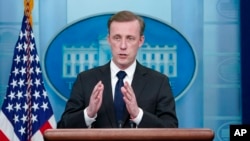The United States says it does not plan on building more nuclear weapons to counter threats from Russia, China and a growing number of adversaries who have or who could soon have nuclear capabilities.
Instead, Washington plans to modernize its existing nuclear arsenal and continue to invest in cutting-edge technologies to keep adversaries in check, according to White House national security adviser Jake Sullivan. He said the administration also would keep open the possibility of talks to prevent a new nuclear arms race.
"The United States does not need to increase our nuclear forces to outnumber the combined total of our competitors in order to successfully deter them," Sullivan told an audience in Washington on Friday.
“Effective deterrence means that we have a better approach, not a more approach,” he said during a speech to the Arms Control Association. "We believe in the current context we have the number and type of capabilities today that we need.”
Sullivan’s comments came as both Russia and China have either rejected or ignored calls for arms control and nuclear talks despite growing tensions.
Russian President Vladimir Putin announced in February that he was suspending Moscow’s participation in the New START treaty, calling the deal absurd given U.S. and Western military aid to Ukraine. None of that aid has involved nuclear weapons.
The deal, signed in 2010, limits the U.S. and Russia to 1,550 deployed nuclear warheads each while providing for each country to inspect the other’s nuclear sites.
The U.S. military, meanwhile, estimates China has more than 400 nuclear warheads and is poised to have 1,500 warheads by 2035.
U.S. officials have also raised concerns about Beijing’s refusal to agree to arms control talks.
Sullivan, however, said the U.S. holds out some hope that such talks are possible, and that Washington was ready to talk separately to both Moscow and Beijing “without preconditions.”
He also noted that while Russia suspended its participation in the New START treaty, it has also said it is willing to abide by some of the treaty’s key tenets, “indicating a potential willingness to continue limiting strategic nuclear forces through 2026.”
And Sullivan said there is precedent for such talks despite tensions and conflicts elsewhere, such as in Ukraine.
“I can't predict exactly what Vladimir Putin will do,” he said. “But there is a track record of our two countries being capable of engaging in these kinds of discussions in a way that serves our respective national interest and the broader common interests.”
As for China, Sullivan urged leaders in Beijing to engage with the U.S. on arms control.
“The very first thing that is necessary is for us to get this conversation going in a real way,” he said. “The PRC could make the bold decision to engage directly with the United States in discussions of strategic stability and nuclear risk, and that it would be the responsible thing to do for the benefit of our two countries and, as I said before, for the benefit of the wider world.”
But whether Chinese leaders will see the need for such discussions remains to be seen.
"They've not been willing to talk," John Kirby, the National Security Council coordinator for strategic communications, said in a press call Friday in response to a question from VOA.
"They've not been willing to engage in a meaningful way with arms control,” he added. “That doesn't mean that we're not going to continue to make the case that it's important.”
China’s military, in particular, has repeatedly ignored or denied requests for calls by U.S. defense officials, though other high-level meetings have taken place.
Sullivan met with a senior Chinese official in Vienna in early May, with the U.S. describing the discussion as “candid, substantive and constructive.”
There were also high-level talks last month between U.S. and Chinese intelligence officials, with CIA Director William Burns traveling to Beijing.
Burns “emphasized the importance of maintaining open lines of communication in intelligence channels," a U.S. official told VOA, speaking on the condition of anonymity to discuss the spy chief’s travel.
Burns’ trip was first reported by the Financial Times.
VOA White House Bureau Chief Patsy Widakuswara contributed to this report.










